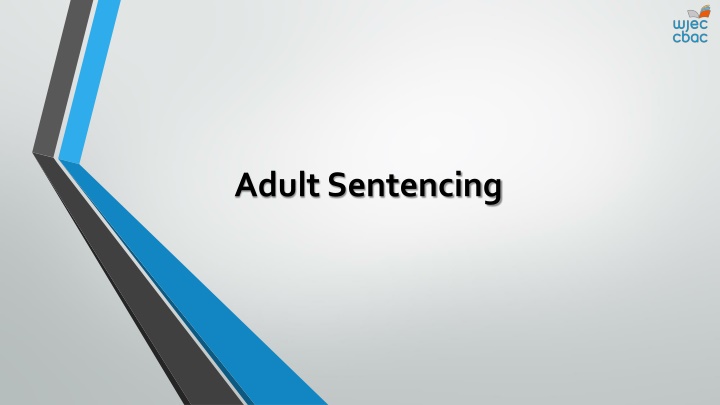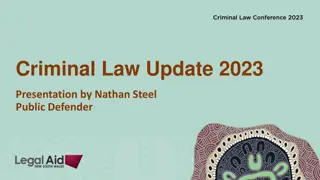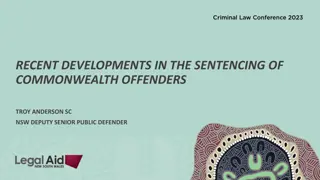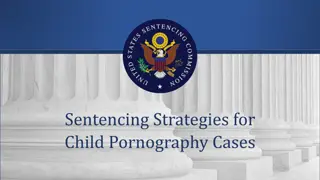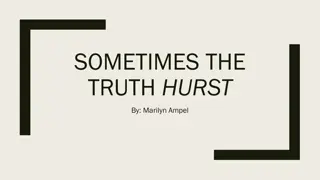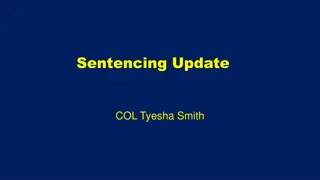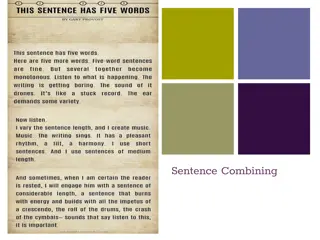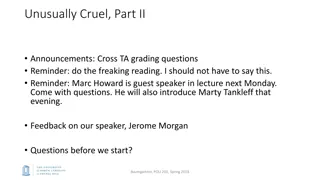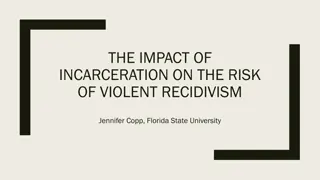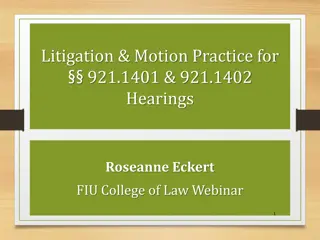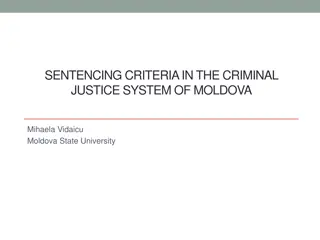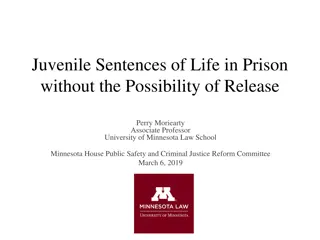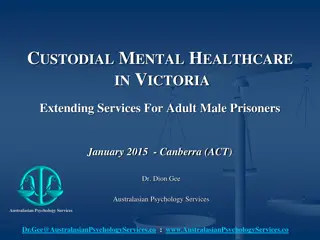Adult Sentencing and Custodial Sentences
Adult sentencing involves 4 main categories of sentences: Custodial sentences (including mandatory life sentences), Community sentences, Fines, and Discharges. Custodial sentences for adult offenders can vary in duration from weekend prison to whole life imprisonment, with some offenses mandating a life sentence upon conviction. Recent legal developments have clarified the requirements for imposing and reviewing whole life sentences in murder cases. The use of whole life terms remains controversial, with considerations of human rights and the possibility of sentence review. Understanding the complexities and implications of custodial sentences is essential in the criminal justice system.
Download Presentation

Please find below an Image/Link to download the presentation.
The content on the website is provided AS IS for your information and personal use only. It may not be sold, licensed, or shared on other websites without obtaining consent from the author.If you encounter any issues during the download, it is possible that the publisher has removed the file from their server.
You are allowed to download the files provided on this website for personal or commercial use, subject to the condition that they are used lawfully. All files are the property of their respective owners.
The content on the website is provided AS IS for your information and personal use only. It may not be sold, licensed, or shared on other websites without obtaining consent from the author.
E N D
Presentation Transcript
Adult sentencing There are 4 main categories of sentences available to the Court: Custodial sentences Community sentences Fines Discharges
Adult sentencing Custodial sentences For adult defendants a custodial sentence means prison The offender will spend some time in prison which can range from weekend prison to whole life imprisonment. A court should not pass a custodial sentence unless it considers that the crime was so serious that only a custodial sentence is justified - Criminal Justice Act 2003 s 152.
Custodial Sentences Mandatory life sentences Certain offences have a mandatory life sentence when committed for the first time e.g. murder. Following reform in 2012 under the amended s224A of the Criminal Justice Act 2003 a court MUST impose an automatic life sentence where an offender has been convicted of two very serious, violent or sexual offences, each justifying on their own a ten year custodial sentence. The sentences lasts for the whole of the offender s life but the judge will state a term of years that the offender must stay in custody before being considered for release. This term is based on the seriousness of the offence and ranges from 12 years to whole life. If offender is deemed suitable for release after that point, he/she is released on life licence which means they can be returned to custody if at any point they commit another offence.
Sentences for murder Mandatory life sentences In the past the Home Secretary decided when a person sentenced to life should be released from prison this was found to be in breach of human rights in R (on the application of Anderson) v Secretary of State for the Home Department (2002) In Vinter v UK (2013) the European Court of Human Rights held that prisoners cannot be given whole life tariffs with no prospect of release However In R v McLouglin; R v Newell (2014) the Court of Appeal disagreed with the ruling in Vinter and said that whole life terms do not breach Article 3 In Hutchinson v UK (2015) the European Court overruled its decision in Vinter whole life sentences are only incompatible with the Convention if there is no possibility of review.
Custodial Sentences An increasing number of offenders are now being given whole life sentences. See Criminal Justice Act 2003 s 269 and schedule 21 for the scale of terms and offences for which they are given. Aggravating and mitigating factors will be considered by the judge to increase or lower the tariff set.
Custodial Sentences Discretionary life sentences The judge will have a choice of giving a life sentence for some serious offences including manslaughter, rape and armed robbery. The choice will be based on the seriousness of the offence and aggravating and mitigating factors involved. The judge can impose any sentence but this is a maximum.
Custodial Sentences Fixed term sentences The judge will set a fixed term of imprisonment according to a range of factors, including whether there is a minimum or maximum laid down for the offence in statute, the seriousness of the offence, the offender s previous convictions etc. Offenders will be released after half of the sentence has been served in prison and spend the remaining time on licence.
Custodial Sentences When a judge imposes a custodial sentence a pre- sentence report will normally be prepared by the probation service (unless the sentence is fixed by law) this report will help the judge in deciding upon the appropriate sentence The Offender Rehabilitation Act 2014 imposes rehabilitative supervision and mentoring support for 12 months upon release from custody for all offenders serving less than 2 years
Custodial Sentences There are a range of other custodial sentences available to the Court: Extended sentences Under s 226A CJA 2003 for specified violent or sexual offences where an additional time period will be added to the sentence where the offender is on licence in the community but under more control if they are likely to commit further offences.The extension period must not exceed 5 years for violent offences or eight years in the case of sexual offences. Home Detention Curfew these were introduced by the Crime and Disorder Act 1998 and provisions are now contained on the CJA 2003. When an offender is released early there will frequently be a curfew requirement attached to the release conditions. Minimum sentences Imposed for specified offences for repeat offenders, e.g. drugs and theft. Suspended sentences The actual sentence can be deferred for up to 2 years and the offender will not serve the sentence if they commit no further offences during that time period, or will serve a reduced sentence.
Custodial Sentences Suspended sentence ss 189-194 of the CJA 2003 a custodial sentence can be suspended A sentence can be suspended for between 6 months and 2 years The offender can be required to undertake activities within the community If the offenders breaches the term of the suspension, then the sentence will be activated Committing another offence during the suspension period will also contrite a breach The Criminal Justice and Immigration Act 2008 abolished suspended sentences for summary only offences
Fines A fine may be imposed for almost any offence other than murder Fines can be awarded to offenders where deemed appropriate by the Courts The Legal Aid, Sentencing and Punishment of Offenders Act 2012 abolished the maximum fine ( 5,000) that the Magistrates can hand down, magistrates can now impose a fine, for more serious offences, of any amount Fines are unlimited in the Crown Court Fines are calculated based on the seriousness of the offence and the offender s means Courts can increase likelihood of payment through an attachment of earnings order or deduction from benefits.
Fines The problem with imposing fines is that many offenders simply do not pay them. They obviously cannot escape punishment by not paying so therefore they end up being imprisoned for non payment. Imprisonment can be seen as extremely punitive for a crime that only required a fine in the first place.
Fines Under the Courts Act 2003, provision was made for a statutory instrument for the discharge of fines by unpaid work. Discharge of Fines by Unpaid Work (Prescribed Hourly Sum) Regulations 2004 state that the fine will be discharged at a rate of 6 for each hour of unpaid work completed. This has significantly reduced the amount of fine defaulters and has been fairly successful.
Fines Under the Courts Act 2003, provision was made for a statutory instrument for the discharge of fines by unpaid work. Discharge of Fines by Unpaid Work (Prescribed Hourly Sum) Regulations 2004 state that the fine will be discharged at a rate of 6 for each hour of unpaid work completed. This has significantly reduced the amount of fine defaulters and has been fairly successful.
Community Sentences Criminal Justice Act 2003 introduced a community order that could be given to offenders with a variety of requirements attached to it. The requirements are set out in the Criminal Justice Act 2003 s 177. The Crime and Courts Act 2013 now states that every community sentence MUST contain a punitive element, such as unpaid work or a curfew order. Home Office statistics show that 56% of offenders who have received a community sentence reoffend within 2 years.
Community Sentences In small groups, locate the list of requirements that can be placed on community sentences in CJA 2003. Once you have this list, find out some details about each of the requirements. Put together a power point presentation to show to the whole group with your findings and for further discussion.
Discharges Conditional discharge Usually used with first time offenders for petty crimes where punishment is not seen to be necessary. Offender will not be punished for the offence provided they commit no further offences for a specified period of time. If they do commit further offences, then they will be brought back to court and punished for both the previous offence and the current offence. Absolute discharge Courts can decide that the offender does not need any formal punishment despite the fact that they have committed an offence.
Other sentences Driving disqualification Can be given for certain driving offences, most commonly drink driving convictions. Compensation and restitution orders Courts can order the offender to compensate the victim (compensation order), or return property to the victim (restitution order).
Other sentences Injunctions to prevent gang-related violence - Policing and Crime Court Act 2009 Criminal Behaviour orders The Anti-Social Behaviour, Crime and Policing Act 2014
Other sentences Confiscation and civil recovery orders Under the Proceeds of Crime Act 2002 the power to confiscate property has increased. The Act allows for the sue of civil recovery of the proceeds of criminal conduct, even where a person has not been convicted see R v May (2008) confiscation orders should deprive defendants of the benefit they have gained from their criminal conduct within the limits of their available means. Deferred sentences Under s.1 of the PCC(S)A 2000 - If the offender s circumstances are going to change which may change their behaviour then the court has the power to defer the sentence by up to 6 months. The offender has to agree to this. It doesn t always mean that the offender will escape conviction as they still may be given a lighter sentence when they return to court.
Other sentences Financial reporting order - provisions for this are contained in the Serious Organised Crime and Police Act 2005 - it requires offenders to give the authorities regular information about their financial affairs for up to 20 years. Such an order is most often used following conviction for offences involving organised crime, such as drug importation and money laundering.
Other sentences Serious crime prevention orders created by the Serious Crime Act 2007 civil order that restricts or mandates the activities of individuals or organisations for up to 5 years The aim of the order is to prevent the commission of serious crime
Other sentences Mental health orders under the mental Health act 1983 the Crown Court can order the detention of offenders in hospital on conviction of an imprisonable offence, if they are suffering from a mental disorder the order can only be made if the court considers such an order the most suitable way of dealing with the offender Binding over for good behaviour dates back to the 13th century provisions contained in the Justice of the Peace Act 1361 and the Magistrates Courts Act 1980.
